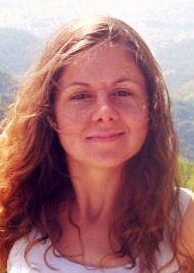 Paola Salardi is the Director of the Trudeau Centre for Peace, Conflict and Justice at the Munk School of Global Affairs and Public Policy at the University of Toronto. Her background is as an applied economist with a focus on economics of conflict, economic development, inequality and political economy.
Paola Salardi is the Director of the Trudeau Centre for Peace, Conflict and Justice at the Munk School of Global Affairs and Public Policy at the University of Toronto. Her background is as an applied economist with a focus on economics of conflict, economic development, inequality and political economy.
Tell us about yourself.
I am an applied economist with a focus on economics of conflict, economic development, inequality and political economy, and moved to the PCJ program in 2018 after spending three years in the Department of Economics. My research has focused on the short and long-term consequences of conflict on welfare, the changing role of women in post-conflict countries, the role of institutions in shaping the presence of violence and on inequality and women’s empowerment. This has included a broad geographic focus, including work on inequality and discrimination in Brazil, violence and school performance in Mexico, violence, education and women’s empowerment in Timor Leste, and humanitarian responses to crises in Kenya, Nepal and the Philippines. I have also previously worked at the Inter-American Development Bank and as a consultant with UN WOMEN. Within the PCJ program, I am particularly excited to introduce an expanded focus on research, research design and research methods, so that everyone coming through the program gains an understanding of how to ask good research questions, how to develop effective research strategies that draw on different methods, and how to link that research to the practical and policy challenges that they are most passionate about in the broader world.
What is the most interesting fact you have uncovered in your research?
The most important overarching message from my research relates to the deep, broad and long-lasting effects of violence and inequality on people’s lives – and, by extension, on the well-being of communities. The impact of high levels of violence comes not only directly through lives lost, but in broader impacts, among others, on the cognitive abilities of children, on access to education, and in sometimes provoking expanded domestic violence. These effects extend far beyond those immediately affected by violence, and can potentially span generations. In the same kinds of ways inequalities across genders and across racial or ethnic groups are not only about short terms differences in economic well-being, but can have more far reaching impacts on the rights and opportunities of different groups – while such inequalities can be remarkably persistent, and reproduced across generations.
What attracted you to the Munk School of Global Affairs and Public Policy, as well as the Trudeau Centre for Peace, Conflict and Justice?
There are three things that make the Munk School, and the Trudeau Centre, extremely exciting places to be based. First, both the Munk School and the Trudeau Centre for PCJ are interdisciplinary. The deepest and best insights arise from considering the world’s most important questions from multiple perspectives, using diverse types of evidence and engaging people from diverse backgrounds. Second, both Munk and PCJ are focused on linking the highest quality academic research to concrete engagement with society and policy makers in seeking to address the world’s most pressing questions. This type of informed engagement is, to my mind, the very best of what Universities have to offer, and creates a dynamic space in which to explore new kinds of research, teaching and engagement with the world. Third, teaching is the most rewarding, important and enriching aspect of my job as a professor, and the PCJ program offers me the chance to engage daily with a group of the most creative, impressive and committed students within the University as they grow as thinkers, as leaders and as individuals.
What is your vision for the Trudeau Centre?
I envision the Trudeau Centre as a platform that is challenging, but also full of opportunities, allowing our students to challenge themselves to think in new, rigorous and creative ways about questions of peace, conflict and justice. I equally envision a program that is as much about personal as academic development: a space in which students develop a critical approach to thinking about the world, and in which they grow as individuals by being confronted by the diverse perspectives presented by their peers and professors. And it is a program that aims to foster a sense of service, offering students the skills and opportunities to channel their passions and energy into efforts to make concrete contributions to addressing important challenges in the world outside the university.
What advice would you give an undergraduate student studying Peace, Conflict & Justice?
Challenge yourself, take risks and dare to ask. Challenging yourself is important because it is when you are outside of your “comfort zone” that will also have the greatest opportunity to grow as a student, as a young professional and, most importantly, as a human being. Taking risks means testing your limits, but also means being willing and ready to make mistakes. In doing so, you will discover that you are capable of more than you imagined – your mistakes may teach you more than your successes, while making you stronger and more empathetic. And, finally, dare to ask. Opportunities are out there waiting to be seized, if you are willing to ask, and you may deserve – and receive – more opportunities than you expect.